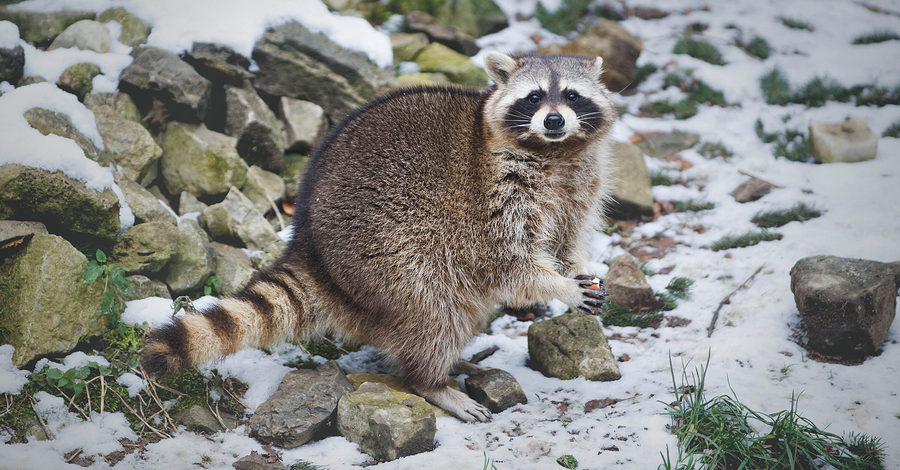If you have trees, water, or woods near your home, you most definitely have a nearby raccoon population. Here in Kentucky, raccoons are wide-spread among rural and urban regions and can be found living in all sorts of different habitats and locations. They are an incredibly intelligent and ambitious, giving them have excellent survival skills. If you believe raccoons could be a possible threat to your property, it may help to educate yourself on their species and how to control their nuisance activity.
Continue reading to review some of the most frequently asked questions about raccoons and raccoon control.

What Does a Raccoon Eat?
Raccoons are omnivores, which means they eat both meat and produce. They also enjoy a diet of berries, acorns, mushrooms, and plant life. They generally dine on fish, small invertebrates, fruits, grubs, insects, vegetables, nuts, grains, and many other foods found in nature. If living nearby water, raccoons will almost always use this as their main source of food. Anything they can grab from the water is a treat, such as salmon, carp, bluegill, frogs, crabs, crayfish, mollusks, worms, and even snakes. They are also known to steal eggs from chicken coups, bird nests, and other hatching grounds. They can pick their own fruit and vegetables, skim through chicken houses and raid farm crops. Raccoons will even eat road-kill!
Do Raccoons Hibernate?
During winter in colder regions of the country, some raccoon species will partake in behaviors similar to hibernation, but not hibernation at all. They may take up and stay in their dens for several weeks at a time; sleeping or remaining stagnant, lowering their body temperatures and heart rates too. They may only venture out a few times a week to hunt for food and find water. This behavior is quite similar to an innate habit called torpor, and is what bears essentially do.
Do Raccoons Carry Diseases?
Raccoons are known carriers of several infectious diseases, viruses, and even parasites like lice, fleas, and mites. Not only can these diseases infect people if exposed, they can also threaten the well-being of our pets. Dogs, cats, and other small animals are at risk of contracted various illnesses and infections from wild raccoons. For this reason, pet vaccinations are vital. Rabies is a common disease contracted and spread by raccoons. Others include canine distemper, roundworm, and leptospirosis.
Will Raccoons Damage My Property?
Raccoons will damage your property, both inside and out depending on how much access they get. An indoor raccoons infestation can breed all sorts of bacteria and unhygienic conditions from leftover urine, droppings, and rotted food. It can also leave behind torn insulation, soiled floorboards, stained ceilings, lingering odors, and much more. Outside is not much different in terms of potential raccoon damage. They like to rip up lawns and garden beds in search of grubs and other invertebrates. They also like to nest under patios and porches, causing the same sort of interior structural damages mentioned before.
Can I Remove Raccoons Myself?
No; and in most states, it is illegal to do so without the proper licenses, permits, and equipment. For this reason, you must never attempt to provoke, touch, catch, trap, harm, or kill a raccoon under any circumstances. It is equally vital to never make a stray baby raccoon your pet. See our blog, “Can I Hunt Wild Raccoons in Kentucky?” to learn about the state laws surrounding raccoon trapping.
How Do I Get Rid of Raccoons in Louisville?
Call 502-553-7622 for safe and humane Louisville raccoon control in Louisville, Kentucky and its surrounding counties. Our DNR licensed and insured raccoon rescue contractors offer a wide range of services for residential and commercial properties, including raccoon removal, control, prevention, proofing, cleanup, attic restorations, and more. Call 502-553-7622 to request a free estimate or information about Louisville raccoon control, today.

